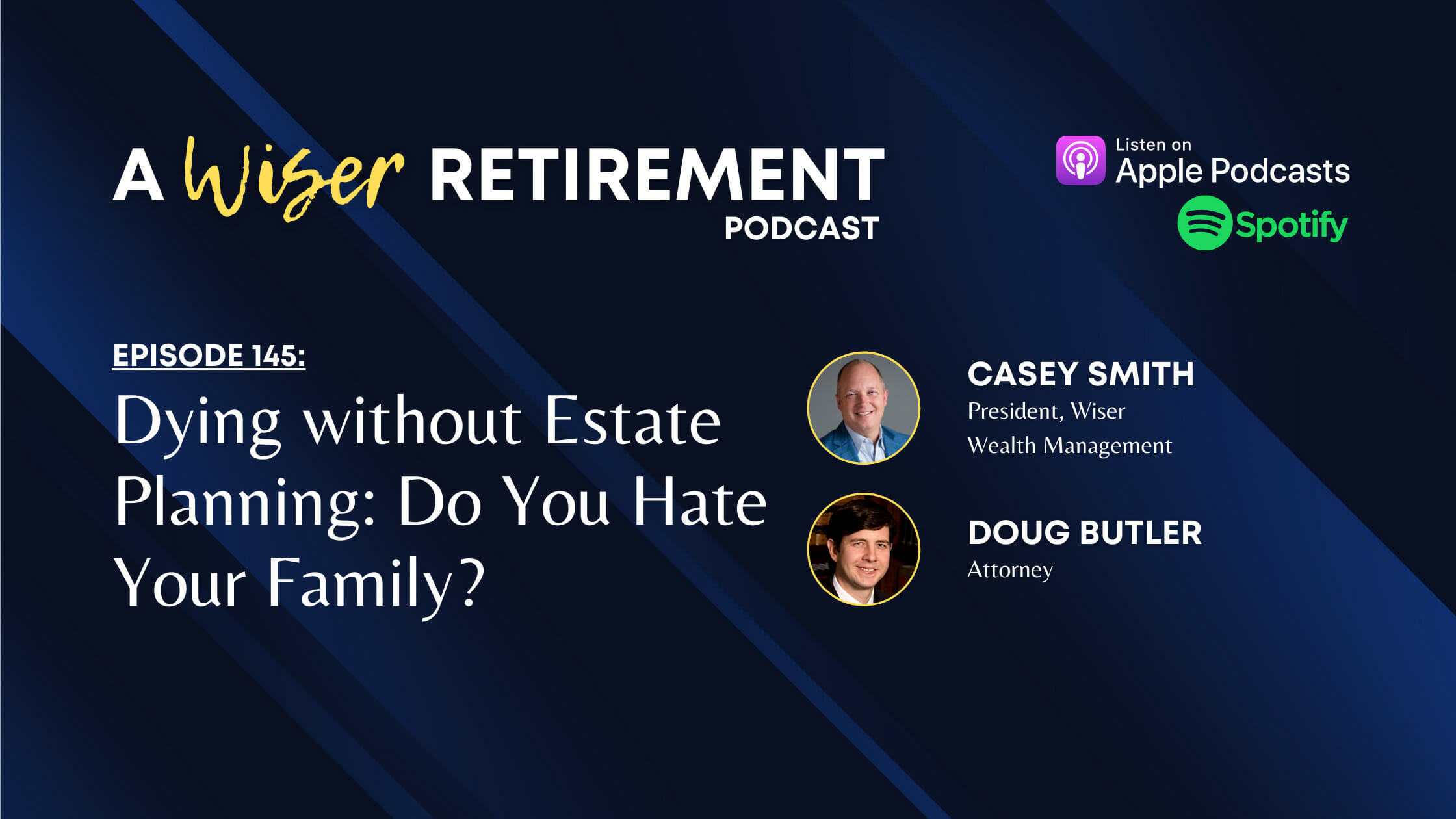
Dying without Estate Planning: Do you hate your family?
On this episode of A Wiser Retirement Podcast, Casey Smith is joined by guest Doug Butler to discuss why estate planning is so important when planning for your future. They also go over what an estate plan consists of, and what can go wrong if you don’t have one.
Listen on Apple Podcasts or watch on YouTube:
SUMMARY:
Being intentional with your finances entails more than just having a budget and sticking to it. It requires a whole spectrum of planning. A large component of this is estate planning, which is crucial to help your family after you are gone.
Real Estate and Your Estate Plan
When we start talking about real estate, the first question to consider is, “is the real estate local?” Different states have different processes regarding probate. Having more than one real estate property in different states can make it difficult for family members to get a hold of without a will. Having a will should name an executor whose responsibility will be to gather all the information on those properties and distribute them according to your will. Some states, such as Florida, have a complicated probate process. When it comes to estate taxes, some states such as Georgia and Florida do not have death taxes if an individual has less than $13M in assets.
The Estate Tax Threshold
The estate tax threshold is always changing. The current estate tax of $13M is due to sunset in a couple of years. It’ll probably go down to $3/$5 million. It may seem like estate taxes are astronomical to those who have to pay them, but statistics show that estate taxes generate less than 0.5% of government revenue.
3 Essential Components to an Estate Plan
Not having a will, a financial power of attorney, or a healthcare directive, can leave your kids in a difficult situation after you’re gone. Anybody that has anything in their name should have those three documents in place. Some people think it’s too expensive, but it’s truly the nicest thing you can do for your family after from the grave. Children already deal with so much after the passing of a parent. The last thing they need is to have to deal with the bureaucratic aspect of death in the family. A will is used after someone passes away, whereas a power of attorney and healthcare directive are for situations that may rise while one is still alive.
There are different types of power of attorney. In general, a power of attorney is someone appointed by you to make financial decisions in case you are no longer able to make them yourself. A healthcare directive appoints someone to communicate your desires concerning your medical state in case you can’t make them known yourself. For example, in a situation of persistent vegetative state. This is important because it takes the pressure off your family to make those decisions for you, which can be traumatizing for some.
What is a Revocable Living Trust?
In addition to a will, there is a revocable living trust. If you have a house that is in a revocable living trust, you don’t have to go through any probate process. It automatically goes to the revocable living trust’s beneficiaries. This can be helpful if people need to sell their house quickly. Granted, the probate process can take around 6 months, even with a will.
A more specific kind of trust is a special needs trust. This is set up for children who can’t take care of themselves and will never be able to do so. The primary reason this is important is if the parent has assets in his or her name and passes away, leaving those directly to the child. The child won’t be able to have access to Social Security or Medicaid, anymore. In this case, they would no longer qualify for government assistance. Having a revocable special needs trust in this case will allow the child to still receive those benefits.
Estate and Business Owners
When it comes to estate and business owners, in the case of the passing of a business owner, typically an LLC will have a buy/sell agreement. What will be passed on is the membership that owns the business, not the business itself. Depending on the value of the business, or the individual share, owners may want to put it in an asset-protected trust.
Being intentional with your finances also has to do with being responsible for your assets. This can be a difficult topic to discuss, and a lot of people feel uncomfortable being asked questions that they never thought about before. However, it is always better to be prepared. It’s not enough to work hard to leave a legacy for your family if after your passing, that legacy becomes a headache for them.
Download our eBook on “Top Reasons Most Financial Plans Fail”
TIMESTAMPS:
0:00 Intro
4:15 Where are the properties located?
8:40 The Estate Tax Threshold
11:10 3 Essential Documents
15:50 Revocable Living Trust
23:35 Estate and Business Owners
LINKS:
Learn more about Casey Smith, Brad Lyons, CFP®, and Missie Beach CFP®, CDFA®
CONNECT:
Twitter, Instagram, Facebook, LinkedIn, and YouTube.
Learn more about A Wiser Retirement podcast and access previous episodes.
Share This Story, Choose Your Platform!
Wiser Wealth Management, Inc (“Wiser Wealth”) is a registered investment adviser with the U.S. Securities and Exchange Commission (SEC). As a registered investment adviser, Wiser Wealth and its employees are subject to various rules, filings, and requirements. You can visit the SEC’s website here to obtain further information on our firm or investment adviser’s registration.
Wiser Wealth’s website provides general information regarding our business along with access to additional investment related information, various financial calculators, and external / third party links. Material presented on this website is believed to be from reliable sources and is meant for informational purposes only. Wiser Wealth does not endorse or accept responsibility for the content of any third-party website and is not affiliated with any third-party website or social media page. Wiser Wealth does not expressly or implicitly adopt or endorse any of the expressions, opinions or content posted by third party websites or on social media pages. While Wiser Wealth uses reasonable efforts to obtain information from sources it believes to be reliable, we make no representation that the information or opinions contained in our publications are accurate, reliable, or complete.
To the extent that you utilize any financial calculators or links in our website, you acknowledge and understand that the information provided to you should not be construed as personal investment advice from Wiser Wealth or any of its investment professionals. Advice provided by Wiser Wealth is given only within the context of our contractual agreement with the client. Wiser Wealth does not offer legal, accounting or tax advice. Consult your own attorney, accountant, and other professionals for these services.





